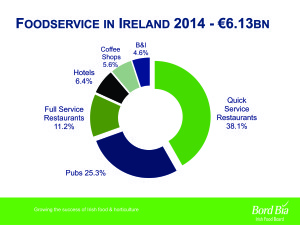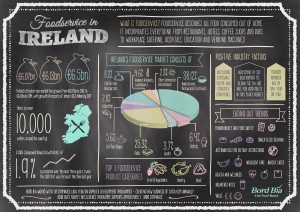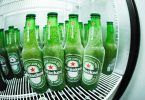1 in 4 eat in pubs
Quick Service Restaurants hold the lion’s share of Ireland’s foodservice channel at 38.1% while Full Service Restaurants, Hotels and Coffee Shops get 11.2%, 6.4% and 5.6% respectively.
RoI’s share of the island’s pub foodservice market is worth just over €1 billion a year despite a Category Annual Growth Rate decline of 3.3% from 2011 to 2014.
By comparison, RoI’s Full Service Restaurants take €485 million (showing CAGR of 1.9% from 2011 to 2014).
Hotels, with a CAGR of 2.8%, take in some €281 million on foodservices.
Bord Bia’s Channel Insights
Bord Bia’s Channel Insights report points out, “Food in pubs has focused in recent years on offering a strong value proposition to consumers as it’s not the primary revenue-driver for these establishments”.
However the Retail Sales Index trends positive generally for bars, pubs and drinking places. This indicates that consumers are spending more at drinking places than in the past which correlates with overall willingness to spend on food away from home.
“Consumer interest in ‘gastro-pubs’ is shifting focus and demand to establishments with more extensive food offerings,” the report adds, “Gastro-pubs do not as closely fit the traditional pubs definition as the majority (approximately 75%) of revenue is from food”.
This trend also closely aligns with the craft beer movement.
“Many consumers have reduced drinking at pubs. Several factors have contributed to this including health/wellness, a greater share drinking at home (for cost purposes) and concerns over drink-driving laws.”
From an operational perspective it’s pointed out that pubs with food on offer are generally seeing better lift in performance than those without.
The prevalence of food pairings is also on the rise at pubs. Some now offer better quality wines by the glass as a result.
“Operators in the channel are also responding with a more robust assortment of craft beers, specialty drinks and seasonal menus,” notes the report which advises “re-educating” the consumer in terms of ‘upgraded’ food offerings and addressing the needs of a more diverse and food-focused customer base.
Trends & Market Drivers
‘Health & Wellbeing’ continues to figure among present consumer food trends “… and there’s a growing interest from overseas visitors in local food and local food producers,” Maureen Gahan, Food Service Specialist with Bord Bia, pointed out at the seminar.
Supply chain transparency and seasonal ingredients are also in demand.
Maureen Gahan pointed out the significance of ‘impulse purchasing’ in foodservice. It can account for around 10% of spend “…. but with a wider food offering that can grow to 30 or 40%” she added.
Pubs benefitting
Pubs are among the commercial channels benefitting from wider economic growth, returning consumer confidence and rising tourist numbers.
“Don’t lose sight of how consumers are behaving,” she advised, “Think convenience, technology, health and provenance – that’s where consumers are heading.”
She reminded the 200 food suppliers and foodservice trade buyers attending the seminar that it was critical to exceed customer expectations and that ‘technology’ is where the consumer’s at today.
“There’s also a growing opportunity for ‘daypart occasions’ as people eat out more,” she concluded.
International eating out trends & drivers
In his somewhat Boratly-titled presentation International eating out trends and drivers – learnings for the Irish market David Henkes, Vice President at Technomic, took the audience through eating out trends and drivers from a global perspective.
‘Local’ is hugely important to consumers having become a major factor in foodservice and one that consumers associate with, he said.
There’s also a demand for outlets to have an expanded ‘daypart’ to their offering.
Such daypart-driving tactics include:
* Late-night operations
* Snacking (afternoon daypart)
* Breakfast – globally underdeveloped in the foodservice channel.
However David Henkes was followed by David Tester, Marketing Manager for Insight at the Compass Group, who told the seminar that Ireland “over-indexed” on breakfasting and snacking out of home.
“Consumers demand food at all hours” he advised, “so operators should look to the daypart expansion to drive incremental sales.”
He pointed out the importance of ‘premiumisation’ of the offering which might include using ethnic ingredients and cooking methods, using ‘real’ ingredients, local sourcing and hand-crafted preparation.
For the operator the top trends include:
* Transparency & Safety
* Customisation – 51% of consumers say that this is important in creating good value (especially for women and the under-35s)
* Technology – changing the game for operators beginning with the emergence of the mobile app as a powerful tool for both consumer and outlet.
“A lot of operators are using these to differentiate themselves,” he said.
It’s a matter of building value beyond price and including not only food and beverage but hospitality and ambience for the price.
The Millennial Consumer
The creature known as ‘The Millennial Consumer’ was introduced by Grace Binchy, Insights & Innovation Specialist with Bord Bia.
She took the audience through how best to engage and interact with the Millennial Consumer of which there are over 500,000 here in Ireland.
They’re an influential grouping, interested in their food and drink to the point that it’s considered an ‘in’ subject – but they can be tough to please.
Nevertheless, the time to connect with them is now, she stressed, for if the operator does this today they’re likely to be able to keep this relationship with the Millennial Consumer throughout their lives – publicans take note.
An Ireland & UK study found not only that food is considered ‘hip’ with the Millennial Consumer, but that they’re also quite ‘stressed’ – thus the need for comfort eating.
“Where previous generations have relied on music, fashion, TV, politicians, renegades, rebels and celebrities to help express and shape who they’re becoming, Millennials have firmly added food and drink as a way of expressing who they’re becoming,” she said, “Food at festivals is being talked about almost as much as the music!”.
Bord Bia’s Insights survey found that Millennials enjoy ‘experiential shopping’ such as visiting a specialist off-licence 1.9 times a month. This compares with 1.2 for Generation X and 0.6 for the Baby Boomers generations.
On the menu
Fitness is ‘in’ with MCs so have healthy food on the menu.
“Think about how to promote healthier eating through portion control and portion understanding,” she advised.
Does your menu offer restraint? MCs want to eat healthily on weekdays but they want to let go at the weekends.
Perhaps proprietors could consider offering ‘half-portions’.
Smaller plates are growing in popularity in the restaurant world. Recently Dublin’s Saba had introduced a healthy menu with nutritionist Erica Doolan.
“Despite lots of talk of healthy living and sporty activity, Millennials love to let go and gorge,” explained Grace, “When Millennials actively choose to ‘pig out’ they want to enjoy it, to luxuriate in the badness, not to feel guilty about gorging. So help them celebrate it.
“They talk about ‘living for the weekend’ because that’s the time they have their important shared experiences with the people who matter most to them.
“Nights in with the girls, nights out with the lads, football games, poker nights, birthdays and reunions.”
And food is more often than not a central part of these shared experiences.
“They’re looking for easy and tasty food and drink experiences that everyone can sit around and share with some good conversation and laughs.”
65% of RoI respondents to the survey agreed with the statement, “While there’re many things I’d like to own, I’d prefer to spend my money on experiences I can share with others” and 70% agreed that, “Food and drink is a really important way to bring people closer”.
Millennials not loyal
Millennials can be a fickle bunch, flitting from one brand to the next, trying out different things.
They don’t feel any great desire to be loyal.
“Therefore it’s really important to be generous, to demonstrate that you appreciate their custom, that you want them coming back again and again.
“They don’t want to be taken for granted. They don’t want their custom to be assumed.”










